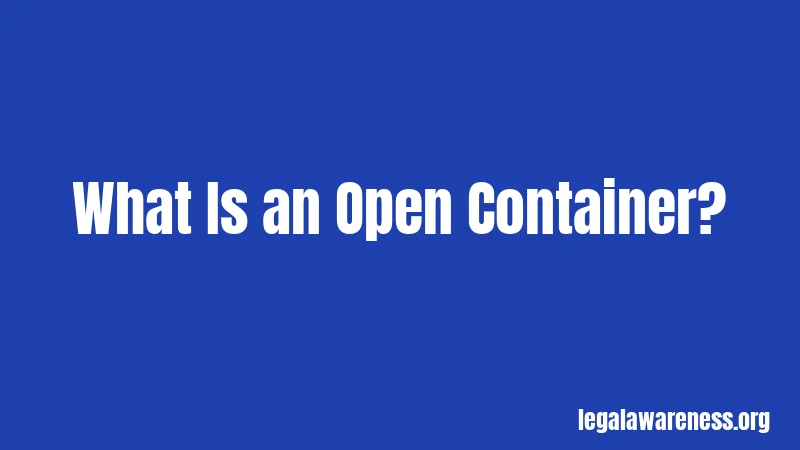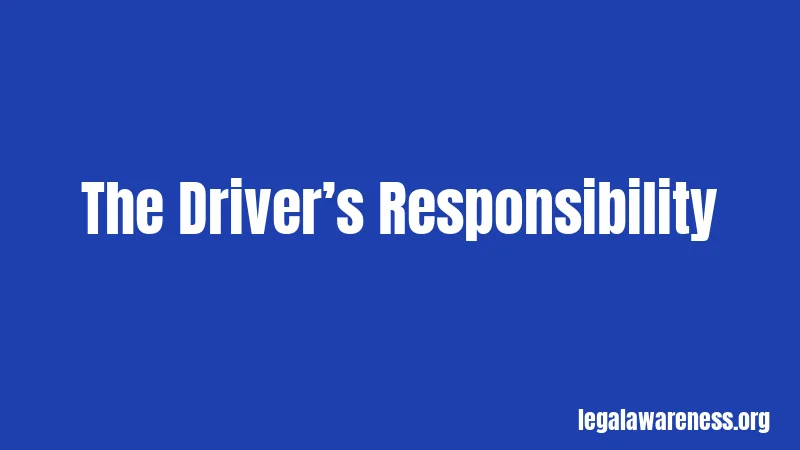Open Container Laws in California (2026): Breaking Down Your Rights
Most people think open container laws only apply when you’re driving. They’re wrong. And that misunderstanding could cost you serious money. California’s open container laws are way stricter than most people realize. Let’s break down exactly what you need to know so you don’t get caught off guard.
Here’s the honest truth: open container violations happen constantly in California. People get cited for things they didn’t even know were illegal. After reading this, you’ll understand the rules and know how to stay on the right side of the law.
What Is an Open Container?

Okay, let’s start with the basics. An open container is any alcoholic beverage that’s been opened, is unsealed, or has been partially consumed. Think of it this way: if you can see the liquid inside, it’s an open container.
Here’s what counts as an open container:
A bottle of beer with the cap off. A wine glass sitting anywhere. A cup of mixed drink. Even a flask that’s been opened. Basically, if someone could drink directly from it, it’s open.
The reason these laws exist is pretty straightforward. California wants to prevent drunk driving and public intoxication. Open containers make it easier for people to drink and drive without stopping.
California’s Basic Open Container Law
California Vehicle Code Section 25602 is the main law you need to know about. This is the one that applies to passengers in a car. Here’s what it says: you cannot have an open container of alcohol in a vehicle. Period.
Not sure what counts as “in a vehicle”? Let me break it down. The open container needs to be accessible to you. That means it’s inside the car, and you could theoretically drink from it. If it’s in the trunk and completely sealed in a box, you’re probably fine. If it’s on the seat next to you? That’s a problem.
This law applies to every passenger in the vehicle. It doesn’t matter if the driver isn’t drinking. You could still get cited for having an open drink in your hand.
Here’s what you need to know: drivers can also be cited for open containers. If the driver has an open drink in the car, that’s a separate violation. Stay with me here, because the penalties get serious.
The Driver’s Responsibility

Drivers in California have an extra burden. They’re responsible for not only their own open containers but also the open containers of their passengers. Wait, that seems unfair, right? But it’s the law.
If you’re driving and your passenger has an open beer, you could both get cited. The driver gets cited because they allowed it. The passenger gets cited for having the container. It’s basically impossible to have open containers in your car as a driver without legal consequences.
Some drivers try to argue they didn’t know their passenger had a drink. Honestly, this argument rarely works. The law assumes drivers are in control of what happens in their vehicle.
Open Containers Outside of Vehicles
Okay, here’s where things get interesting. Open container laws in California aren’t just about cars. You could get cited for open containers in other places too. Actually, this part confuses a lot of people.
California Penal Code Section 25602 also covers public spaces. You can’t drink from an open container in most public places. Parks, beaches, streets, parking lots. These are all off-limits for open drinking.
Wait, but what about designated drinking areas? Good question. Some places do allow open drinking. Certain bars have outside seating where drinking is permitted. Some restaurants allow alcoholic beverages on patios. But these are exceptions, not the rule.
Not sure what counts as public? Generally speaking, anywhere the public can go is covered by the law. That includes parking lots (even private ones sometimes), parks, beaches, and sidewalks. When in doubt, don’t drink from an open container in public.
The weirdest part? Homeowners can face citations for open containers in their own yards if the yard is visible from the street. Some cities interpret the law this way, others don’t. It’s worth checking your local ordinances.
What About Your Home?

Here’s the good news: inside your home, you can drink whatever you want. Completely legal. You can have open containers, you can get absolutely drunk, it’s your private space.
The key word is “private.” Your home is private. But your patio? That depends on whether it’s visible from the street. Some cities consider front patios public space. Back patios are usually safe.
If you live in an apartment or condo, common areas are not private. That means hallways, pools, and recreation rooms are off-limits for open containers. Get caught drinking there and you’re violating the law.
Think of it like a traffic ticket, but with way more potential consequences. It stays on your record. It affects employment opportunities. It’s not something to take lightly.
Penalties and Fines
Okay, this is where it gets real. Open container violations have serious penalties in California. Most people don’t realize how expensive this can get.
For a first offense of having an open container in a vehicle, you’re looking at a fine ranging from $250 to $1,000. Yep, up to a thousand dollars for having a beer visible in your car. But wait, there’s more.
You could also face up to six months in county jail. In practice, most first-time offenders don’t get jail time, but it’s possible. The judge has discretion. They could sentence you to jail, probation, both, or neither.
The real cost doesn’t stop at the fine and jail. You’ll likely face court costs, paying for a criminal record, and potentially increased car insurance rates. Some employers do background checks. An open container violation shows up. Not great when you’re looking for work.
Here’s the thing: the second time you’re caught, the penalties increase. A second offense means fines up to $1,000 and up to six months in jail. Third and subsequent offenses can mean up to one year in county jail.
For open containers in public spaces (not vehicles), the penalties are actually pretty similar. Fines of $250 to $1,000 for a first offense. Up to six months in jail. It’s the same basic structure.
How Open Container Violations Affect Your Record
This part matters more than people realize. An open container violation is a misdemeanor in California. That means it goes on your permanent criminal record.
Employers see it. Landlords see it. Schools see it. Anyone running a background check will find it. This isn’t like a traffic ticket that disappears after a certain time. It’s a permanent criminal conviction.
Some professions are especially affected. Want to work in healthcare? Schools? Government? An open container conviction could cost you the job. It shows a lack of judgment about following the law.
You might think you can get it expunged (removed from your record). California law does allow expungement under Penal Code Section 1203.4, but you have to meet certain conditions. You need to have completed probation. You need to not be serving any sentence. Generally, you can petition for expungement after you’ve satisfied your sentence. But it’s not automatic.
Honestly, this is the part most people miss. The fine is temporary. Jail time is temporary. The criminal record? That could affect you for decades.
Special Circumstances and Exceptions
Now, there are some situations where open containers might be legal. These exceptions are pretty narrow, so read carefully.
Passengers in a tour bus or party bus might be allowed to have open containers. Some charter bus services are specially licensed to allow drinking. Make absolutely sure before you drink though. Check with the company.
Limousines have a different set of rules. The passenger area in a limousine is technically separated from the driver. This is one of the few places where open containers are legal for passengers. But only if you’re in the passenger compartment that’s separated from the driver by a partition or window.
Taxis and rideshare vehicles (Uber, Lyft) are not exceptions. You cannot drink in an Uber. You cannot drink in a Lyft. If you do, you’ll get cited. The driver could also face penalties for allowing it.
Here’s where it gets tricky: some cities and counties in California have stricter laws than the state. The state law is the baseline, but your city might have added more restrictions. San Francisco, for example, has additional open container regulations in certain neighborhoods.
Recent Changes to California’s Open Container Laws
California’s open container laws haven’t changed dramatically recently, but there have been some updates worth knowing about. The laws are being enforced more strictly in some areas.
More cities are using open container violations as a way to address public intoxication. The trend is toward stricter enforcement, not looser rules. So even if the law itself hasn’t changed, cops are citing more people.
One thing that’s changing is the focus on establishments that serve alcohol. Some cities are cracking down on bars and restaurants that allow customers to take drinks outside. If you’ve ever left a bar with a to-go drink, some cities now restrict this practice.
The takeaway? Open container laws in California are being enforced more aggressively. Don’t assume the cop won’t cite you just because it’s your first offense. Assume they will.
How to Stay Compliant
Let’s get practical. Here’s exactly what you need to do to avoid an open container citation.
In your vehicle: all drinks must be completely sealed and unopened. If you buy a six-pack, it stays in the package until you get home. Simple as that. Even if you’re not the driver, make sure any drinks around you are sealed.
Make it a habit to check your passengers’ hands. If someone’s drinking from an open container, ask them to put it away. You’re responsible as the driver. Better to be a little annoying than to get a citation.
At home: drink whatever you want, however you want. Just keep it inside. If you want to drink on your patio, first check your local ordinances. Some cities allow it, some don’t. When in doubt, stay inside.
In public: beer, wine, and liquor are never safe in an open container. The only exception is if you’re in a specifically designated area that allows it. Bars with outside seating sometimes qualify. Certain parks allow alcohol in designated areas. But these are exceptions.
Stay with me here because this part is important. Don’t assume your friend knows the law. If you’re at a beach or park party, make sure everyone keeps their drinks sealed until they’re actually drinking. Then seal it back up between sips.
What Happens If You Get Cited
If a cop cites you for an open container violation, here’s what to expect.
You’ll get a citation. It’s a ticket, basically. It tells you the date of your court appearance or when you need to respond. Don’t ignore it. Seriously. Ignoring a citation makes things way worse.
You have options. You can plead guilty and pay the fine. You can plead not guilty and go to court. You can request traffic school (though this usually only applies to traffic violations, not open containers).
Many people get a lawyer to fight the citation. Open container cases sometimes involve technical issues. For example, was the container really “open”? Was it really in the vehicle? A lawyer can help you argue these points. Some cases get dismissed.
If you can’t afford a lawyer, the court will appoint a public defender. This is free. You have the right to legal representation.
Here’s what most people don’t know: you can sometimes negotiate with the prosecutor. If this is your first offense, you might be able to plead to a reduced charge or get alternatives to a traditional citation. A lawyer can help with this.
Frequently Asked Questions
Can I drink from a water bottle containing alcohol? Technically, if it’s an open container, it’s illegal. The fact that you’re trying to hide what’s inside doesn’t matter. If alcohol is in there and it’s open, you could be cited.
What if the open container is in the trunk? Trunks are safer because they’re not accessible to you. But if the trunk isn’t completely separate from the passenger area (like in some hatchbacks), it might still count as accessible. When possible, seal it in the trunk.
Can I drink at an outdoor restaurant or bar? Yes, if the restaurant or bar has a designated drinking area that complies with local laws. Patios with barriers or special licenses are usually fine. Ask before you drink.
Do these laws apply to passengers in the back seat? Yes. All passengers are covered. It doesn’t matter where you’re sitting in the vehicle. If you have an open container, you can be cited.
Can I get an open container citation in my own driveway? Possibly, depending on whether your driveway is visible from the street and how your city interprets the law. Front driveways are risky. Back driveways are usually safe.
What if I’m on a private beach or private property? Private property is generally safer, but it depends. If the property owner has prohibited drinking, you could still get in trouble (though for trespassing, not open containers). Always ask permission first.
Final Thoughts
Open container laws in California are serious. They’re enforced regularly. The penalties are real. Getting a citation affects your life way longer than you’d expect.
The best strategy is simple: keep your alcohol sealed until you’re home or in a designated drinking area. Don’t risk it. A thousand-dollar fine and a criminal record aren’t worth the convenience of having an open drink in your car.
If you do get cited, don’t panic. Talk to a lawyer. You have options. But honestly, the best option is avoiding the situation in the first place.
Stay informed, stay compliant, and when in doubt, keep that bottle sealed.
References
California Vehicle Code Section 25602: Open Container Laws
California Penal Code Section 25602: Public Open Container Violations
California Courts: Criminal Records Expungement Information
